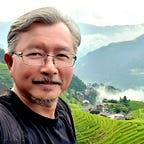Changes
Day Thirty Two
One of the literary giants of China in the 20th century must be Lu Xun. Acclaimed for his short stories and essays, it was said that he would not be able to win a Nobel Prize for Literature even posthumously because he did not have a epic novel to his name. But if he were to be alive today, he would not have been interested. His means was literary, but like Confucius, the Chinese sage of long ago, his aims were political.
Lu Xun wanted to shape the soul of a nation emerging from centuries of decline and slumber to rightfully take her seat at the table of respected sovereign nations. To do that the masses had to be awakened to the present reality and take ownership of the responsibility to respond to the sea of changes.
One of my favourite short stories Lu Xun told was the story of Kong Yiji. A well-educated Confucian scholar in modern republican China. Trained in classical studies of the past two millenia, Kong found himself out of job and out of place in a China landscape which has undergone tremendous social and political change. A revealing sign was his clothing and demeanour of a past era which was totally out of style with the times.
A frequent client of a particular Chinese tea house, he tried to make his presence felt by attempting to dump his unwanted antiquated scholarship on unwitting patrons of the tea house. This only aroused both the amusement and disdain of the crowd in the tea house. He became a laughing stock as he was unable to pay for his inexpensive tea and snacks and unemployable in the new and changed social landscape. Kong was unabashedly brazen about the former but oblivious of the latter. He had lost touch of the real world. That was his comical tragedy.
The tea house was gracious to offer him credit to keep him out of hunger and starvation as he sought to maintain his sense of dignity as a man of learning but without means. Before long, he stopped coming and was missed in the tea house. But as time went by, no one talked about him any more as he had become a forgotten man.
The ancient Chinese recognised since time immemorial that changes happen in life all the time, with changes in weather and climate to changes in political fortunes and the rise and fall of nations. There are elements within the grasp and mastery of mankind, There are those beyond human control, within the realms of natural law as well as the supernatural. The mystery of life’s changes within the cycles of the natural and beyond… into the mystical.
The ancient Yijing (Book of Changes) was compiled over two thousand years ago and studied as a human striving towards mastery of the mystery of life. The aim is to understand how one can survive and flourish in an uncertain world. That could perhaps explain the tenacity of the Chinese people, obliging to go with the flow of nature (and social changes) and seeking to first of all, survive. Then there is subsequently the hope to attend to the well-being of the community so that life can flourish.
The higher order questions of community and national well-being can be and must be addressed by the intellectuals, those trained and placed in positions of leadership and decisions. The awakening of the ruling class to the privilege and responsibility of addressing the plight of the masses caught in the sea of change must continue. We hope more Lu Xun will arise to play their roles in history, to awaken thoughtful people to be responsive and to take action.
“I know that there is nothing better for people than to be happy and to do good while they live. That each of them may eat and drink, and find satisfaction in all their toil — this is the gift of God.” (Ecclesiastes 3: 12–13)
Journey with me over 40 days as we reflect on life and hope in the wilderness
See Previous Day’s reflection on Simplicity. See next reflection on Wuchang Fish
